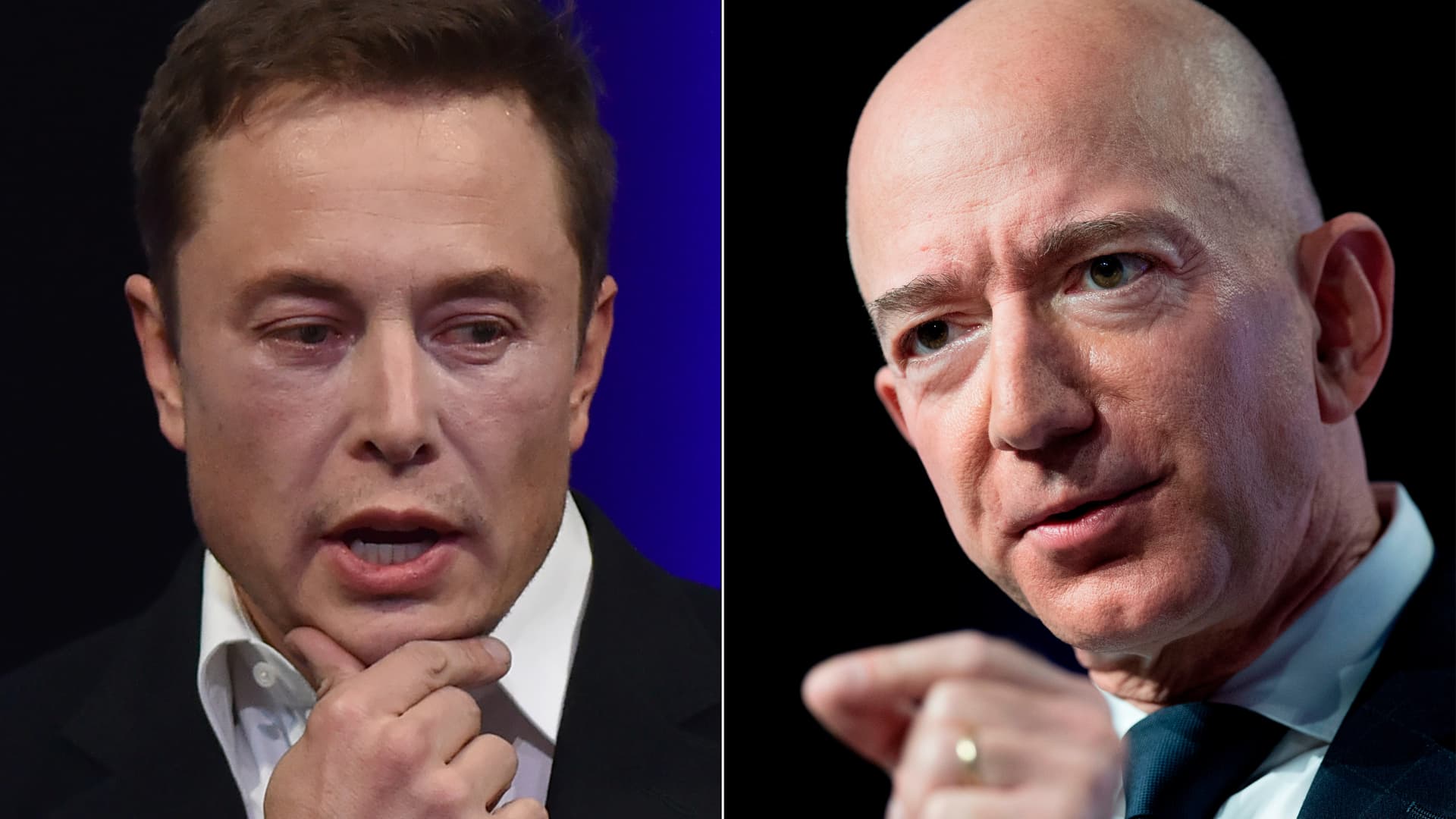An Amazon shareholder lawsuit says the company snubbed SpaceX for valuable satellite launch contracts because of Jeff Bezos’ personal rivalry with Elon Musk, who has taunted his fellow billionaire’s space ambitions for years.
Cleveland Bakers and Teamsters Pension Fund, or CB&T, filed a shareholder complaint on behalf of Amazon in the Delaware Court of Chancery on Monday.
The pension fund’s lawsuit centers around Amazon’s blockbuster purchase of rocket launches for its Project Kuiper satellite internet system. The suit emphasizes the rivalry between Bezos and Musk, featuring screenshots of the SpaceX and Tesla chief’s social media taunts about the Amazon founder’s space efforts at the e-commerce giant and his space company, Blue Origin.
Last year, Amazon announced what it called the biggest rocket deal in the commercial space industry’s history, signing launch contracts with United Launch Alliance (ULA), Arianespace, and Bezos’ Blue Origin. In its May annual shareholders meeting, Amazon disclosed it expects to pay about $7.4 billion for launch services through 2028, with $2.7 billion expected to go to Bezos’ wholly owned Blue Origin.
CB&T alleges that Bezos, Amazon’s executive chair – as well as CEO Andy Jassy and members of the company’s board of directors who also serve on its audit committee – “consciously and intentionally breached their most basic fiduciary responsibilities” by awarding contracts for Kuiper missions on a trio or rockets that have yet to launch and are years behind schedule.
The lawsuit adds that Amazon leadership “excluded the most obvious and affordable launch provider, SpaceX, from its procurement process because of Bezos’ personal rivalry with Musk.”
SpaceX is the leading rocket provider in the world, with its Falcon 9 rockets advertised at a comparatively low market price of about $70 million per launch. In 2023, the company is flying rockets at a record-setting pace, with a launch about every four days on average.
Amazon rejected the lawsuit’s claims.
“The claims in this lawsuit are completely without merit, and we look forward to showing that through the legal process,” an Amazon spokesperson said in a statement to CNBC.
Blue Origin has yet to provide a statement in response to CNBC’s request for comment on the lawsuit.
CB&T, represented by New York-based Grant & Eisenhofer, alleged two counts of breach of fiduciary duty against the defendants. CB&T did not disclose the size of its Amazon stake, nor its total assets under management.
The suit alleges that Amazon leadership failed to conduct “any meaningful analysis” on the rocket launch market, and approved the contracts after “two cursory meetings” and without protecting negotiations “from Bezos’ glaring conflict of interest.”
In July 2020, CB&T said that Bezos led Amazon management in telling the company’s audit committee that discussions were under way with Blue Origin and three other companies for launch contracts, but SpaceX “was not among the four” options.
The suit also alleges the Bezos-led team did “not even consider SpaceX,” and the Amazon audit committee did not ask for or receive updates on the negotiations for nearly 18 months. Contract values, and how much Amazon is paying in total for the launches, are redacted in the lawsuit.
In January 2022, the suit says Bezos’ team told the Amazon audit committee that two contracts had been fully negotiated with Blue Origin and ULA. Notably, the contract to use ULA’s Vulcan rocket brings direct benefit to Blue Origin, as each Vulcan is powered by a pair of Blue Origin’s BE-4 rocket engines.
CB&T alleges the audit committee received only “a brief summary of the terms of the contracts” and “rubberstamped” the deal “after only a few minutes of discussion.”
“It had no information about how Bezos and his management team conducted the negotiations with Blue Origin. It had no information about the level of Bezos’ involvement. It had no information about how many other launch providers (if any) Bezos and his management team explored contracting with. It had no information about Blue Origin’s struggles to develop the New Glenn, about how these struggles might jeopardize Amazon’s ability to meet its FCC-mandated 2026 deadline, or about how Blue Origin planned to overcome these struggles,” CB&T’s lawsuit says.
In March 2022, the Bezos team presented a summary of the Blue Origin and ULA contracts to the Amazon board for approval, along with a third contract for European company Arianespace. CB&T highlighted that the deal was a sharp contrast to Amazon’s $13.7 billion acquisition of Whole Foods, a process in which the company engaged financial advisors.
“By completely abdicating its fiduciary duties, the Board has already exposed Amazon to substantial harm and placed the Company’s entire Kuiper program at needless risk. And with each passing day, as Amazon’s chosen launch partners (Blue Origin in particular) continue to struggle and SpaceX continues to prove itself, this Board-inflicted harm continues to grow,” CB&T wrote.
“Bezos, it must be assumed, could not swallow his pride to seek his bitter rival’s help to launch Amazon’s satellites,” the suit adds.
